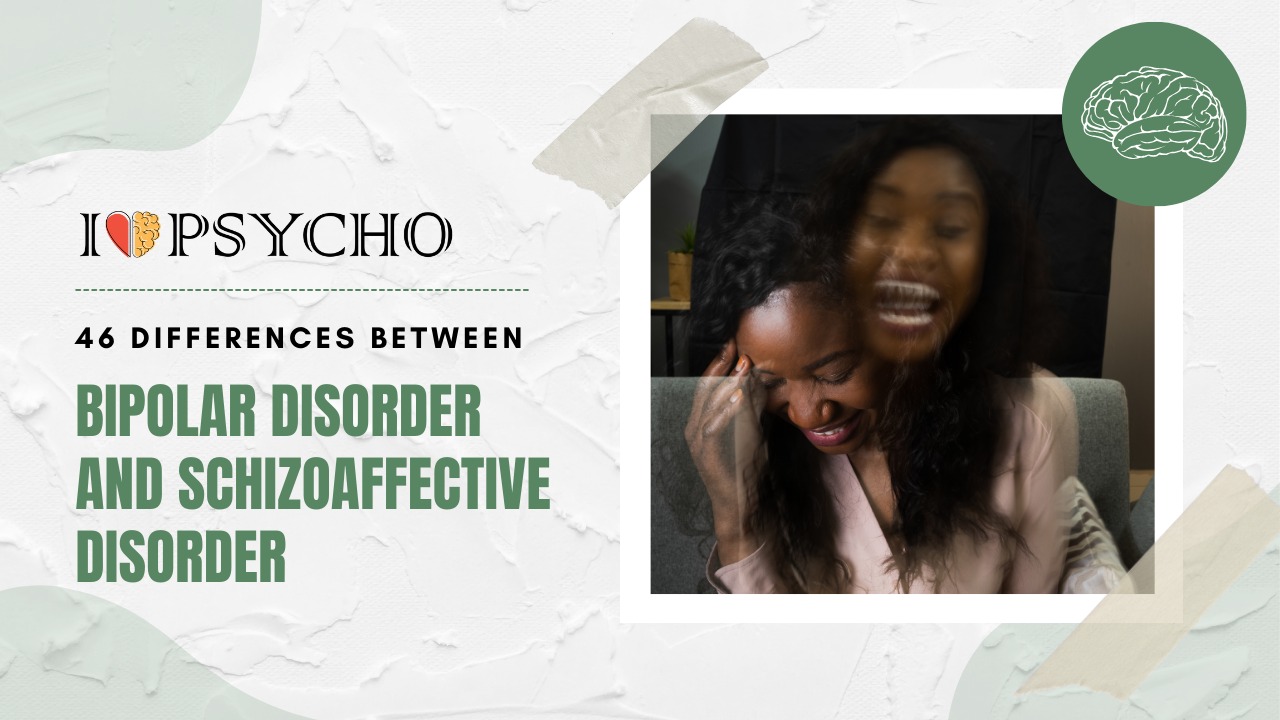Two misunderstood mental health illnesses, bipolar disorder, and schizoaffective disorder, can affect a person’s thoughts, feelings, and behaviors. Despite overlapping symptoms, they have distinct traits. Bipolar illness causes significant mood changes, including mania and sadness. These emotional swings can compromise sleep, energy, and function. Bipolar illness mood episodes seldom entail hallucinations or delusions. The manic-depressive oscillation is crucial.
Schizoaffective disorder, on the other hand, mixes mood disorders like depression or mania with schizophrenia, a mood disease that causes hallucinations and delusions. Schizoaffective illness can cause bipolar-like mood swings and psychosis that makes reality testing difficult. Schizoaffective disorder differs from bipolar illness because psychotic symptoms occur beyond mood episodes.
Schizoaffective disorder has psychotic symptoms without mood abnormalities, a key difference. Schizoaffective disorder is more complicated than other mood disorders and psychosis. These illnesses have different treatments. Psychotherapy, mood stabilisers, and antipsychotics can treat bipolar illness mood swings. To treat psychosis and mood symptoms, schizoaffective disorder typically requires antipsychotics and mood stabilisers. Individualised therapy are necessary for each patient’s symptoms and demands.
Finally, bipolar illness and schizoaffective disorder have separate causes and treatments, while sharing certain symptoms. Bipolar disorder involves emotional swings between mania and depression without psychosis. Schizoaffective disorder has mood episodes and continuous psychotic symptoms not mood episodes. Effective management and quality of life for people with these illnesses depend on mental health specialists’ diagnosis and treatment programmes.
Also Read: 42 Difference Between Anxiety and Depression
Here are the 46 differences between Bipolar Disorder and Schizoaffective Disorder in a table format as requested:
|
S.No. |
Aspect |
Bipolar Disorder |
Schizoaffective Disorder |
|
1 |
Core Symptoms |
Mood swings between mania and depression |
Combination of mood disorder (like bipolar) and psychosis |
|
2 |
Mood Episodes |
Manic and depressive episodes |
Mood episodes (manic, depressive) + psychotic symptoms |
|
3 |
Psychosis |
Occurs primarily during mood episodes |
Can occur outside mood episodes as well |
|
4 |
Duration of Symptoms |
Mood episodes are relatively brief |
Psychotic symptoms can be more persistent |
|
5 |
Schizophrenia Symptoms |
Typically lacks schizophrenia symptoms outside mood episodes |
Can include schizophrenia-like symptoms |
|
6 |
Diagnosis Criteria |
Based primarily on mood disorder criteria |
Requires both mood and psychotic symptoms for diagnosis |
|
7 |
Onset |
Usually begins in late adolescence or early adulthood |
Onset can vary but often starts in late adolescence |
|
8 |
Prognosis |
Generally better with appropriate treatment |
Outcomes can be more challenging due to combined issues |
|
9 |
Treatment Approach |
Focuses on mood stabilization and management |
Requires treatment for mood and psychosis simultaneously |
|
10 |
Medications |
Mood stabilizers, antipsychotics, antidepressants |
Antipsychotics, mood stabilizers, and sometimes antidepressants |
|
11 |
Response to Medication |
Typically responsive to mood stabilizers and antidepressants |
Response can vary and may be less predictable |
|
12 |
Hallucinations |
Less common in Bipolar Disorder |
More common, especially auditory hallucinations |
|
13 |
Delusions |
Less prevalent in Bipolar Disorder |
More frequent, including bizarre delusions |
|
14 |
Duration of Psychosis |
Shorter duration during mood episodes in Bipolar Disorder |
Longer-lasting psychosis can occur |
|
15 |
Interepisode Functioning |
Generally better functioning between mood episodes |
Interepisode functioning can be more impaired |
|
16 |
Emotional Stability |
Significant mood instability |
Mood disturbances often coexist with psychosis |
|
17 |
Cognitive Functioning |
Typically less impaired during mood episodes in Bipolar |
Cognitive deficits can be present even between episodes |
|
18 |
Suicidal Behavior |
Higher risk during depressive episodes in Bipolar |
Elevated risk due to mood and psychotic symptoms |
|
19 |
Mania vs. Psychosis |
Mania and psychosis are separate in Bipolar Disorder |
Mania can overlap with psychosis in Schizoaffective |
|
20 |
Occupational Functioning |
More likely to return to work between episodes in Bipolar |
More difficulties with consistent employment |
|
21 |
Family History |
More common family history of mood disorders in Bipolar |
More common family history of psychosis |
|
22 |
Lifetime Prevalence |
Lower lifetime prevalence than Schizoaffective |
Higher lifetime prevalence |
|
23 |
Course of Illness |
Characterized by distinct mood episodes |
Complex course with mood and psychotic symptoms |
|
24 |
Elevation of Mood |
Mania or hypomania characterized by elevated mood |
Mania often accompanied by psychosis in Schizoaffective |
|
25 |
Distinctive Mood Cycles |
Cyclical pattern of mood episodes |
May have irregular and overlapping mood and psychotic episodes |
|
26 |
Disability Impact |
Mood episodes can impair functioning but often recoverable |
Greater overall impairment due to combined symptoms |
|
27 |
Insight into Illness |
Better insight during mood episodes in Bipolar Disorder |
Insight can be impaired, especially during psychosis |
|
28 |
Depressive Features |
Depressive episodes are part of Bipolar Disorder |
Depressive features are present but may vary in severity |
|
29 |
Age of Onset |
Onset in late adolescence or early adulthood in both |
Variable onset age but often overlaps with Bipolar |
|
30 |
Genetic Factors |
Genetic susceptibility to mood disorders |
Genetic susceptibility to both mood and psychotic disorders |
|
31 |
Sleep Patterns |
Altered sleep patterns during manic and depressive episodes |
Sleep disturbances can accompany psychotic episodes |
|
32 |
Duration of Stability |
Stable periods typically exist between mood episodes |
Limited periods of stability between mood and psychotic episodes |
|
33 |
Recurrence Rate |
Recurrent mood episodes separated by stable periods |
Recurrent mood and psychotic episodes with varying intervals |
|
34 |
Comorbid Conditions |
Can co-occur with anxiety and substance use disorders |
Often comorbid with substance use and anxiety disorders |
|
35 |
Cognitive Symptoms |
Cognitive symptoms typically tied to mood state |
Cognitive deficits may persist even during stable periods |
|
36 |
Affective Fluctuations |
Pronounced fluctuations in affective states |
Fluctuations in mood may coexist with psychotic symptoms |
|
37 |
Positive Symptoms |
Less likely to exhibit positive symptoms of psychosis |
More likely to exhibit positive symptoms of psychosis |
|
38 |
Negative Symptoms |
Negative symptoms of psychosis are less prominent |
Negative symptoms may be present, but variable |
|
39 |
Impulse Control |
Impulsivity during manic episodes |
Impulsivity may be influenced by mood and psychosis |
|
40 |
Social Withdrawal |
More associated with depressive episodes in Bipolar |
Social withdrawal may occur during both mood and psychotic episodes |
|
41 |
Etiology |
Multifactorial, including genetic and environmental factors |
Complex etiology involving genetic and environmental factors |
|
42 |
Long-Term Outcomes |
Generally better long-term outcomes in Bipolar |
More variable long-term outcomes due to combined symptoms |
|
43 |
Pharmacotherapy Focus |
Medications primarily target mood stabilization |
Medications target both mood and psychotic symptoms |
|
44 |
Treatment Response |
Often responds well to mood stabilizers |
Treatment response can be more challenging and variable |
|
45 |
Relapse Prevention |
Focus on preventing mood episode relapses |
Requires strategies to prevent both mood and psychotic episode relapses |
|
46 |
Diagnostic Challenge |
Diagnosis is often more straightforward based on mood symptoms |
Diagnosis can be challenging due to overlapping symptoms |
Also Read: 31 Difference between Schizophrenia and Schizoaffective Disorder
Frequently Asked Questions (FAQS)
Q.1 What is the main difference between bipolar disorder and schizoaffective disorder?
Bipolar disorder causes intense manic and depressed episodes. These mood swings might affect normal living. Schizoaffective disorder, on the other hand, combines mood disorders like depression or mania with schizophrenia symptoms including hallucinations, delusions, and warped thinking. Psychotic features independent of mood disturbances distinguish schizoaffective disorder.
Q.2 Can individuals with bipolar disorder experience hallucinations and delusions like those with schizoaffective disorder?
While bipolar disease is mostly about mood swings, extreme manic episodes can include psychotic symptoms including hallucinations and delusions. Bipolar disorder symptoms are usually linked to mood episodes and are less persistent than in schizoaffective disorder.
Q.3 How are these disorders diagnosed?
Bipolar and schizoaffective disorders require a complete mental health examination. They employ standardized evaluation methods and examine medical history and symptoms. For a significant amount of the illness, mood and psychotic symptoms must be present independently to diagnose schizoaffective disorder.
Q.4 What treatment options are available for these disorders?
Bipolar disorder therapies include mood stabilizers, antipsychotics, antidepressants (with care), and psychotherapy to regulate mood fluctuations. Schizoaffective illness requires antipsychotics and mood stabilizers for mood and psychotic symptoms. Mental health therapies like CBT and psychoeducation can also help.
Q.5 Can these illnesses be treated, effectively?
Yes, proper therapy can control both illnesses. Although cures are unlikely, symptom alleviation and quality of life can be achieved. Managing symptoms and avoiding relapses requires medication compliance, frequent counseling, a supportive environment, and good lifestyle choices.









